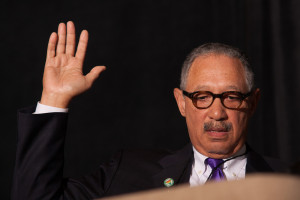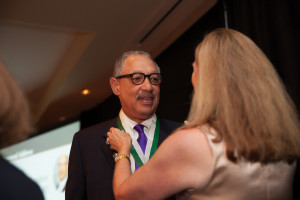
Paul R.G. Cunningham, MD, was installed as the 163rd president of the North Carolina Medical Society (NCMS) at the society’s Annual Business Meeting on Saturday afternoon, Sept. 17, at the Grandover Resort in Greensboro. He is the first African-American to hold the office.
Before his swearing in ceremony, Sandhya Thomas-Montilus, MD, president of the Old North State Medical Society, which was formed to represent African-American physicians, called attention to the significance of the event.
“This is a historic moment for both our societies,” she said. “The Old North State Medical Society was founded in 1887 because the North Carolina Medical Society wouldn’t let doctors of color in. Now, 130 years later, you have your first black president — a year after the first non-black president became president of the Old North State Medical Society.”
Dr. Cunningham has served as Dean of the Brody School of Medicine at East Carolina University since 2008. Prior to joining the Brody School, he served as professor and Chair of the Department of Surgery at the State University of New York, Upstate Medical University.

Board Certified in General Surgery, Dr. Cunningham is a graduate of the University of the West Indies. He completed his residency in surgery at the Mount Sinai School of Medicine in New York City. No stranger to eastern North Carolina, he served for many years as both an educator and a surgeon at East Carolina University, Pitt County Memorial Hospital and Bertie County Memorial Hospital prior to holding his positions at the State University of New York.
As outgoing NCMS President Docia Hickey, MD, said before administering the oath of office to Dr. Cunningham: “Paul has all the qualities you might expect in a medical school dean. Great wisdom, patience, clinical expertise, ability to motivate and communicate effectively and well-honed leadership skills. These abilities also will make Paul an outstanding NCMS president.”
In his remarks after being installed, Dr. Cunningham encouraged physicians, who today are faced with many complex challenges and transformative changes in our health care system, to continue to focus on patients and to strive for consensus in order to speak with ‘one voice.’
“I am unwilling to accept that we are unable to be unified in our resolve, and therefore in all of our actions,” he said. “There is more than one issue that will require our consensus as a profession. These issues are common to us all. Nary one of us can be exempt.”

